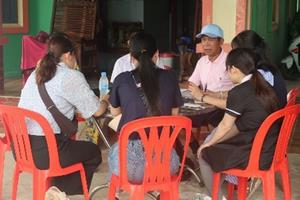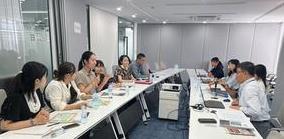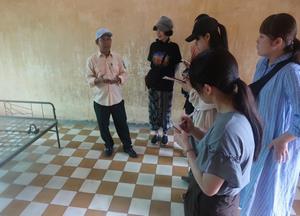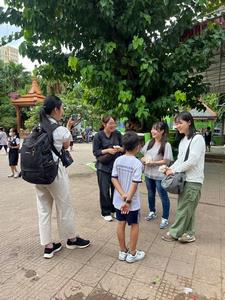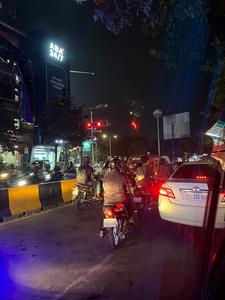- Global Collaboration Center
- Activity
- Report on Cambodia Study Tour (2024)
ページの本文です。
Report on Cambodia Study Tour (2024)
2025年3月17日更新
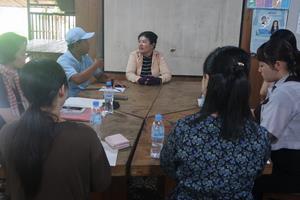
Interview at workshop of SALUAUAU in Siem Reap
(Mr. Vuthy, the one in the blue hat, is our study tour guide)
From September 20 to 27, 2024, four students took part in a study tour to Cambodia, visiting three locations: Phnom Penh, the capital of Cambodia; Siem Reap and its outskirts, a tourist destination that includes the World Heritage Site of Angkor Wat; and Takeo, a peaceful area located about a two-hour drive from Phnom Penh. In each area, we participants conducted interviews with local people at the sites related to each research topic. Since three of us were on their first trip abroad, everything they saw was new to them.
I conducted research on compulsory education in Cambodia by interviewing Cambodians from all walks of life. Among the interviews, the stories of two local staff members, a man and a woman, in their 40s, at the JICA Cambodia office that I visited the day before the end of the tour, were the most impressive. Although many people over 30s who I interviewed said they had to drop out of school for financial reasons, the JICA staff I interviewed had college degrees. They told me, “It was not unusual for people around us to have college degrees,” in response to the question, “Was it unusual for your generation to have college degrees?” They also told me about a girl who skipped grades and studied ahead of her age because the classes were easy, and about someone who found it difficult to help their child with homework because they had to drop out of elementary school for economic reasons. This made me realize that even within Cambodia, people’s living conditions and environments of people can be very different, and each person perceives things from their own perspective. It was also interesting to hear the stories of those who are raising children. Some of them said, “Because I couldn’t go to school, I want my child to get a good education.” This sentiment makes me feel as if they are passing on the baton of hope. I feel that the people of Cambodia are live in a constant flow of passing on the baton to the next generation. When I asked complaints about school, most of the respondents expressed concern about traffic accidents on the way to school. In fact, I myself had difficulty crossing the street because of the heavy traffic and the limited number of traffic lights. When I heard the words, “I feel relieved when I see my child’s face when he/or she comes home safely from school,” my heart was filled with the emotions of love and prayers that parents have for their children.
Khmer is Cambodia’s official language. I sometimes felt frustrated because I could not communicate what I wanted to say; I could only say “okung” (which means thank you) and “chomriap suor” (which means hello). However, even though I did not understand the language, I was able to interact with many of the locals. At the public elementary school we visited on the first day, girls came up to us and gave us plumeria flowers that we could barely hold in both hands. I also remember seeing a boy eating and sharing the candy I gave him as thanks for the interview with his friends. Additionally, during our visit to a workshop of SALASUSU (Japanese NGO) in Siem Reap, we took a commemorative photo with the person next to me, making a hand-sign heart. The bright smiles of the Cambodian people brought me joy many times. I felt that even if words could not be conveyed, something could still be communicated just by smiling at them.
On the other hand, I came across Cambodia's dark and shadowy past. I visited the Tuol Sleng Genocide Museum on the second day of the study tour. I was shocked by what I saw, wondering how someone could have done such a cruel thing. Hundreds of photographs of those who died in Tuol Sleng were in the museum, and I will never forget their gaze. Mr. Vuthy, our study tour guide, had lived under the Pol Pot regime and expressed this feeling: “I feel it is like a dream that I’m alive now.” This made me feel that I should not take my life blessed for granted. Mr. Vuthy mentioned that he has two ages: his registered age and his biological age. He lowered his registered age by four from his biological age to avoid conscription and to receive an education after the fall of the Pol Pot regime. The story made me realize that many Cambodian people were somehow managing to live in hardship, even after the fall of the Pol Pot regime. I believe that the development of education in Cambodia is slower compared to other countries due to the loss of intellectuals, including teachers, during the Pol Pot regime.
While I was on my way back from dinner the night before the final day, I saw a truck full of women returning from the factory pass by. In that moment, I felt that each woman on the truck had a life and something to protect. This was an emotion I had never experienced, even once, in the crowded trains I take every day in Tokyo. It was precisely because of the unfamiliar environment that I gained insights I usually overlook. I believe I will remember the faces of Mr. Vuthy, Mr. Ron, the driver, and many others I met in Cambodia whenever I come across the word ‘Cambodia’ in Japan. I feel very happy about this and am truly glad to have participated in the study tour.
Lastly, I would like to express my heartfelt gratitude to all those who kindly agreed to be interviewed, to Mr. Vuthy for serving as our guide and interpreter, to Mr. Ron, the driver who supported us throughout our long journey, and to Ms. Oda and Mr. Hirayama for conducting the study tour and diligently striving to fulfill our research requests. Thank you very much.
(Fuka Miwa, sophomore student, Department of Human Life Studies, Faculty of Human Life and Environmental Sciences)
 Website of SALASUSU (in Japanese)
Website of SALASUSU (in Japanese)
 Website of ECOLOGGIE Inc.
Website of ECOLOGGIE Inc.
 Website of Wonderfy Inc.
Website of Wonderfy Inc.
 Website of JICA Cambodia Office
Website of JICA Cambodia Office
 Website of Cambodia-Japan Cooperation Center(CJCC)
Website of Cambodia-Japan Cooperation Center(CJCC)





